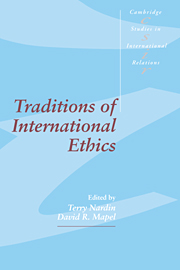Book contents
- Frontmatter
- Contents
- Contributors
- Preface
- 1 ETHICAL TRADITIONS IN INTERNATIONAL AFFAIRS
- 2 THE TRADITION OF INTERNATIONAL LAW
- 3 THE DECLARATORY TRADITION IN MODERN INTERNATIONAL LAW
- 4 CLASSICAL REALISM
- 5 TWENTIETH-CENTURY REALISM
- 6 NATURAL LAW AND INTERNATIONAL ETHICS
- 7 KANT'S GLOBAL RATIONALISM
- 8 UTILITARIANISM AND INTERNATIONAL ETHICS
- 9 THE CONTRACTARIAN TRADITION AND INTERNATIONAL ETHICS
- 10 LIBERALISM AND INTERNATIONAL REFORM
- 11 MARXISM AND INTERNATIONAL ETHICS
- 12 THE IDEA OF RIGHTS IN INTERNATIONAL ETHICS
- 13 BIBLICAL ARGUMENT IN INTERNATIONAL ETHICS
- 14 CONVERGENCE AND DIVERGENCE IN INTERNATIONAL ETHICS
- Index
- Titles in the series
5 - TWENTIETH-CENTURY REALISM
Published online by Cambridge University Press: 15 September 2009
- Frontmatter
- Contents
- Contributors
- Preface
- 1 ETHICAL TRADITIONS IN INTERNATIONAL AFFAIRS
- 2 THE TRADITION OF INTERNATIONAL LAW
- 3 THE DECLARATORY TRADITION IN MODERN INTERNATIONAL LAW
- 4 CLASSICAL REALISM
- 5 TWENTIETH-CENTURY REALISM
- 6 NATURAL LAW AND INTERNATIONAL ETHICS
- 7 KANT'S GLOBAL RATIONALISM
- 8 UTILITARIANISM AND INTERNATIONAL ETHICS
- 9 THE CONTRACTARIAN TRADITION AND INTERNATIONAL ETHICS
- 10 LIBERALISM AND INTERNATIONAL REFORM
- 11 MARXISM AND INTERNATIONAL ETHICS
- 12 THE IDEA OF RIGHTS IN INTERNATIONAL ETHICS
- 13 BIBLICAL ARGUMENT IN INTERNATIONAL ETHICS
- 14 CONVERGENCE AND DIVERGENCE IN INTERNATIONAL ETHICS
- Index
- Titles in the series
Summary
The preceding chapter explored the roots of the realist tradition. This chapter looks at the work of twentieth-century realists who typically have seen themselves as participants in a common theoretical enterprise that reaches back at least to Machiavelli (Carr 1946, 63–64; Meinecke 1957) or Thucydides (Morgenthau 1946, 42; Gilpin 1986, 304). Realists such as E. H. Carr and Hans Morgenthau played central roles in establishing international relations as an academic discipline in Britain and the United States. In recent years realism has reestablished its predominance in the academic study of international relations. Realist arguments also remain prevalent in contemporary policy debates. All of this, as well as the continuing relevance of the realist challenge to morality in foreign policy, makes these writers an essential subject for this volume.
Realist premises
Rather than focus on individual theorists, however, I will consider twentieth-century realists as a group, reflecting a distinctive school or style of analysis with four central premises. Realism stresses “the primacy in all political life of power and security” (Gilpin 1986, 305). This focus arises from an account of human nature that emphasizes self-interest and the egoistic passions and an account of international relations that emphasizes the constraints imposed by international anarchy. As a result realists typically argue that “universal moral principles cannot be applied to the actions of states” (Morgenthau 1954, 9). These realist premises concerning egoism, anarchy, power, and morality in international relations define the basic structure of the realist tradition of international ethics during the twentieth century.
- Type
- Chapter
- Information
- Traditions of International Ethics , pp. 85 - 111Publisher: Cambridge University PressPrint publication year: 1992
- 26
- Cited by



